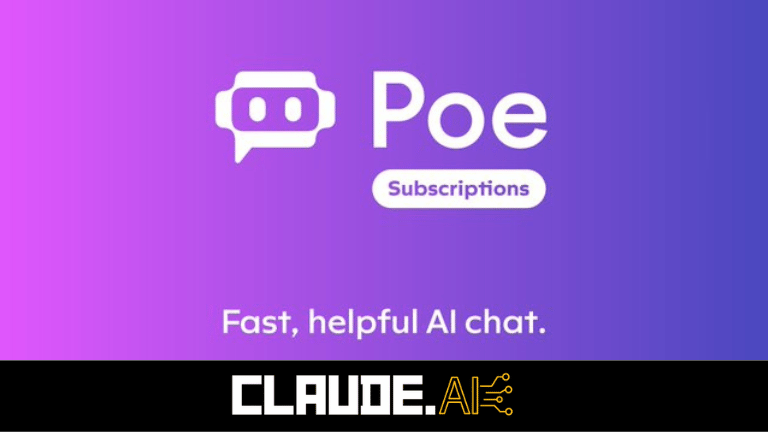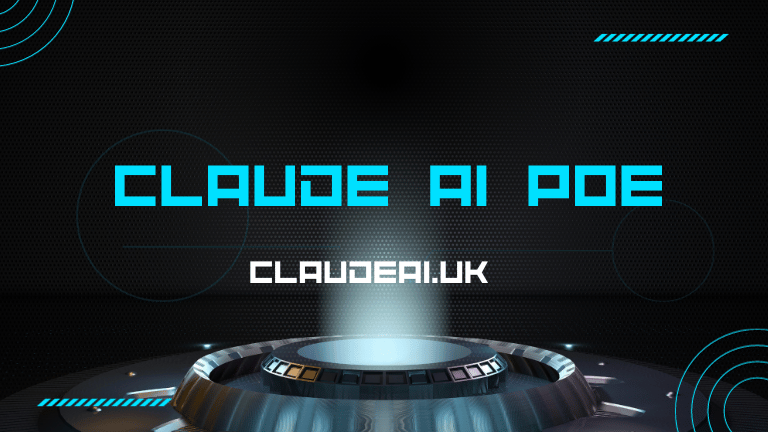Claude AI Poe. With the rise of artificial intelligence (AI), a new chapter in poetry is being written. AI systems like Claude are demonstrating an ability to generate original poems that resemble human-created works. This emerging technology raises intriguing questions about creativity, art, and the future of poetry itself.
The Evolution of Poetry Generation
While Claude represents a cutting-edge achievement in AI-generated poetry, the foundations were laid decades ago. Early forays into computer-created verse focused on rule-based and template systems. Programs would follow set formulas for rhyme, meter, and imagery to produce rudimentary poems.
Researchers struck greater creative strides in the 2000s by incorporating machine learning. Rather than hand-coded rules, algorithms were trained on vast collections of existing poetry. This allowed systems to recognize patterns and themes in order to produce more sophisticated compositions. Scientists began exploring recurrent neural networks, modeling the structure of language itself to mimic human skills.
Generative adversarial networks (GANs) brought another leap forward. GANs pit two neural networks against each other to yield improved output through an adversarial process. Such advances enabled poem generators to craft original verses close in quality to human poets. AI reached an inflection point where its compositions could stand on their own artistic merits rather than just demonstrating technical achievements.
Inside Claude’s Poetry Composition System
Claude represents the state-of-the-art in AI-generated poetry. It builds upon modern algorithms while making key innovations that push poetic boundaries. So what exactly powers Claude’s poesy? The foundation lies in its training data – Claude learns by analyzing a diverse collection of poems, from Shakespeare to Emily Dickinson. This allows it to recognize effective linguistic techniques that stir emotion and conjure vivid imagery.
Claude AI takes a probabilistic approach to language modeling. As it’s constructing a poem line-by-line, Claude predicts probable sequences of words based on patterns in its training data. This enables coherent flow between lines and stanzas. Claude also employs rules-based constraints to encourage rhyme, meter, and structure. The combined result is human-seeming poetry with conceptual depth.
Anthropic engineered creativity and an artistic voice into Claude. It generates poetry with purposive intent rather than random ramblings. Allusions, metaphors, and other literary devices give Claude’s poems shape and direction. Use of vivid sensory descriptions makes the poetry immersive. These capabilities derive from Claude’s foundational natural language proficiencies.
Finally, Claude can accept high-level creative direction when generating poems. Users can specify themes, genres, styles, or other guiding parameters. This makes Claude’s poetry adaptable for everything from sonnets to free verse. Claude essentially fuses language mastery with human-directed artistic expression.
Claude’s Poetry in Action
While the technical details behind Claude are fascinating, it’s the end product that truly matters. So how well does this AI poetry stand up? Surprisingly well according to early reception. Here are a few excerpts from Claude-generated poems:
Across the vacant azure sky
A flock of birds go drifting by,
Their wings ablaze with morning’s glow,
Watch where they wend, how swift they fly.
With boughs outstretched and leaves unfurled,
The old oak tree stood in the world, Its broken limbs recalled a time
When stronger boughs faced storm and wind.
Within the labyrinth of dreams, Reality unravels at the seams, Each twisted turn reveals a truth, As inner shadows see the light.
These samples demonstrate Claude’s poetic voice. Rich sensory imagery and clever use of rhyme and meter show technical mastery. Thematically, Claude exhibits high-level creativity in its unique perspectives on nature, aging, dreams, and truth. While not yet Pulitzer Prize-worthy, Claude’s poems display artistic merit beyond clever programming.
Claude’s Implications for the Future of Poetry
Claude represents a turning point for algorithmically generated verse. But what could this technology mean for poetry’s future? Here are several possibilities:
- Inspiration for human poets – Claude’s novel connections and perspectives might inspire new creative directions for human poets. Reading Claude’s poems could spur new ideas.
- Democratization of poetry – AI systems could make poetry composition accessible to more people. Not everyone can craft a sonnet but they may find creative fulfillment through AI collaboration.
- Personalization – Tailoring poems to reader interests and emotions becomes possible. Imagine poetry customized for weddings, eulogies, love letters or other special occasions.
- Preserving poetry – Claude could continue creating new poems in the style of poets after they have died. AI poetry could help their legacy endure.
- Efficiency – Need a poem fast for a gift or publication? Claude can rapidly generate quality results. This improves workflow for human poets and publishers.
- Discovery of new styles – As Claude creates more works, it may organically develop its own styles that humans have never conceived. AI capabilities could expand poetic horizons.
Evaluating the Merit and Ethics of AI Poetry
The growth of AI-generated poetry inevitably raises questions regarding merit and ethics. Can a computer truly be creative? Does synthetic poetry devalue human art? Such issues tie into debates regarding AI rights and responsibilities.
From one perspective, Claude composes through computational analysis rather than open-ended creativity. Its poems ultimately reflect algorithms designed by programmers. However, Claude exhibits self-directed expression within those constraints. Given poetry’s goal of eliciting emotion and contemplation, Claude’s output succeeds on artistic grounds regardless of its underlying process.
The ethics of passing Claude’s synthetic poems as human-created work remains questionable. Proper labeling of an artificial versus human source is prudent, though no consensus standard yet exists. As consumers become more aware of generative AI, its role should be evident through the volume of new work produced. If Claude’s poetry stands on its own merit, concerns about deception may ultimately fade.
AI poetry also raises important questions about the technology’s social impacts. If Claude develops a recognizable style valued by publishers, could it disadvantage human poets competing for exposure? Or perhaps it democratizes poetry by enabling more voices to engage in creative expression through AI collaboration. Particularly as the technology improves, guidelines regarding responsible and ethical practices will be needed.
Claude’s Next Stanzas
The story of AI-generated poetry is still being written. While Claude displays impressive technical and creative capabilities, the technology remains in its infancy. Advances in machine learning will likely yield further improvements in coherent long-form poetry. Truly evocative and emotionally compelling poetry from AI may soon emerge.
Anthropic plans continuous development of Claude’s poetry functions. It aims to enhance Claude’s literary mastery while also improving its responsiveness to human direction. More natural integration of semantic intent and poetics will provide users greater control over the themes, styles, and emotions exhibited. Interactivity will also increase, with Claude adapting its generation approach based on user feedback.
The path ahead will involve extensive tuning of algorithms, training data, and parameters to achieve the full potential of AI as a poetic muse. Technical prowess must serve to realize compelling artistic expression. Claude’s collaborators have set ambitious goals for its growth into a versatile poetics advisor. The future looks bright for AI to augment, inspire, and transform poetry’s creative landscape.

FAQs
How was Claude trained to generate poetry?
Claude was trained on a diverse collection of poems, from Shakespeare to Emily Dickinson, to recognize effective poetic techniques like rhyme, meter, imagery, and metaphor. This allows Claude to compose original poems that resemble human poetry.
What kind of neural networks power Claude’s poetry skills?
Claude uses transformer-based language models, reinforced with rules on rhyme, rhythm, and structure. This hybrid approach allows Claude to create human-seeming poetry with conceptual depth.
Can Claude emulate famous poets’ styles?
Yes, Claude can be provided high-level guidance to generate poems mimicking poets like Robert Frost, Langston Hughes, or Sylvia Plath. This leverages Claude’s literary training data.
How does Claude ensure its poems make coherent sense?
Claude employs probabilistic language modeling to predict likely word sequences during poem generation. This enables smooth flow between lines and logical stanza structure.
Does Claude write poetry randomly or with specific intent?
Claude generates poetry with purposive intent, incorporating literary devices to convey contemplated themes. This goes beyond randomly generated words or phrases.
Can Claude adapt poems to a provided topic or emotion?
Yes, users can specify desired themes, genres, styles, emotions or other guiding parameters. This allows Claude to tailor its poetry accordingly.
Does Claude develop its own poetic styles over time?
As it produces more poems, Claude may organically evolve novel styles that extend poetic conventions in new AI-native directions.
How long does it take Claude to generate an original poem?
Claude can typically produce a professionally-structured poem on provided topics in under a minute. Quality increases with lengthier generation time.
Can Claude explain the intent behind its generated poems?
Not explicitly, but over time Claude may develop capabilities to add annotations explaining its creative process and poetic goals.
Could Claude’s poetry displace human poets?
Claude aims to inspire human creativity rather than replace it. However, responsible AI practices should be followed as capabilities improve.
Does Claude produce poetry collections or just individual poems?
Currently Claude generates individual poems, but has potential to produce poetry collections centered around specific themes.
Can Claude integrate poetic inspiration from images or other media?
In the future, Claude may incorporate multimedia inputs like images, video, and audio to enhance its multimodal poetry generation.
Does Claude have a distinct personality that comes through?
Not strongly yet, but Claude’s developing style provides some artistic individuality. Further training to deepen its “voice” is planned.
Can users collaborate interactively with Claude on poetry?
Basic capabilities for Claude to refine poems based on user feedback exist, alongside tools for co-writing poems.
How can I try out Claude’s poetry skills myself?
You can access Claude’s poetry generation capabilities through its website interface or via API integrations. Sign up for a trial!

